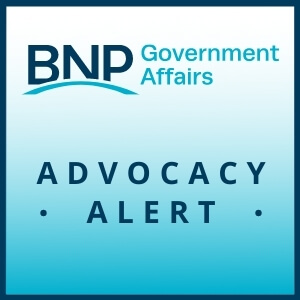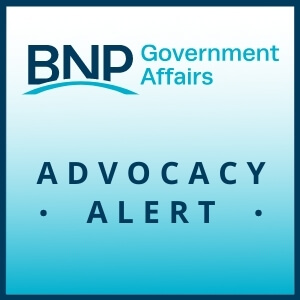Advocacy Alert: NYS Budget
State lawmakers recently approved the 2023 state budget. In total, the budget will spend $229 billion – a record amount and a 33% increase in spending since 2019.
After the Governor released her Executive Budget proposal, the BNP communicated our budget concerns and goals to lawmakers at our Legislative Lunch. As negotiations unfolded, the BNP also sent a “final budget considerations” letter to address the largest priorities of Buffalo Niagara employers. Through the lens of these priorities, the state budget was disappointing. To the state’s credit, it did manage to avoid the most harmful proposals being discussed: a ban on gas in existing buildings or a statewide rent control program. However, plenty of harm was done, and legislators missed multiple opportunities to improve New York’s business climate.
Not every budget issue grabbed headlines. This brief was prepared to make industry leaders aware of some of the lesser-known issues that are nonetheless important to employers across our region. Questions? Email JVeronica@thepartnership.org.
Workforce & Education
- Expanded Child Care Assistance. The enacted budget will increase income eligibility for the Child Care Assistance Program. Families earning up to 85% of the state median income – about $93,200 for a family of four -- will qualify for subsidies. The BNP supported this enhancement.
- Childcare expansion incentives. The budget creates a tax credit for business entities that create or expand childcare capacity for the children of their employees. The BNP will share more information on this program when available.
- Income Disregard. The budget includes a six-month income disregard for social service recipients who are participating in job training programs. The BNP supported this effort and encourages leaders to take further action to bridge the benefits cliff.
- SUNY tuition increases. The Legislature rejected Governor Hochul’s proposal to raise tuition at SUNY schools. Instead, the state added $256 million in new operational aid to SUNY schools.
Energy, Climate & Telecommunications
- Natural gas ban. The state will ban natural gas hookups in new construction. The ban will take effect in 2026 for buildings under 7 stories, except for commercial or industrial spaces larger than 100,000 sq. ft. In 2029, the ban extends to all buildings. However, this provision is a major improvement from what was originally proposed. The Governor’s January proposal would have also banned natural gas building systems and equipment in existing buildings, which would have an astronomical cost on New York employers and consumers. Although the BNP has concerns about this rule’s impact on energy affordability and reliability, the BNP is pleased its advocacy on this issue helped fend off the most damaging proposal. Learn more here.
- Cap-and-Invest. The budget did not fully establish a Cap-and-Invest program, which the BNP opposed. However, under the CLCPA, the Governor believes she has authority to establish a Cap-and-Invest program through executive action and plans to do so. The proposal will force employers to bid for the right to emit carbon in their operations. The BNP is hosting an event with DEC officials on this issue on Thursday 5/25; register here.
- Extended Producer Responsibility. The EPR recycling reforms would force producers of recyclable material to pay for recycling those products. This provision was NOT settled in the final budget, but remains a focal point of negotiations for the rest of the legislative session. Negotiations also continue on the “Bottle Bill,” which would increase the 5-cent deposit on bottles and also extend it to more types of containers.
- Building Public Renewables. The budget authorizes the New York Power Authority to build and operate renewable energy generation facilities. Notably, this section also requires NYPA to phase out small natural gas-fired “peaker” plants by 2030.
- Brownfield Cleanup Program. The budget extends BCP deadlines by allowing site preparation credits to be claimed for up to seven years after the issuance of a certificate of completion, when the COC was issued between 2015 and 2021. This change is intended to enable BCP projects that were delayed by the COVID-19 pandemic to proceed. The BNP also pushed for the repeal of the BCP’s $50,000 application fee, but this change was not included in the final budget.
- Climate Superfund. This proposal would have imposed significant punitive fines on emitters of greenhouse gases for their perceived contributions to climate change. The BNP opposed this proposal and is pleased it was not included in the final enacted budget.
- Next Generation 911. The budget includes $20 million for the creation and operation of a fiberoptic cable-based network for public safety calls. The BNP supported this initiative.
Healthcare
- Pay and Pursue. The Legislature did not agree to the Governor’s proposal to alter medical billing by requiring insurers to pay emergency and inpatient care claims before reviewing their medical necessity.
- Coverage mandates for behavioral health. As part of the budget, insurers will be required to cover and reimburse for behavioral health services. This includes mobile crisis intervention services and school-based mental health clinic services.
- Medicaid rate increases. The final budget includes a 7.5% rate increase for inpatient care and 6.5% increase for outpatient care rates. The BNP pushed for larger increases to support our healthcare system, and will continue to do so in future budgets.
- Medical debt collection. The state will require hospitals to have collection policies and to use a uniform financial assistance form provided by the state.
- Home care worker wages. The state will raise the minimum wage for home care workers to: $17.55 in 2024; $18.10 in 2025; $18.65 in 2026.
- 340b/NYRx. The controversial Medicaid changes to the 340b program took effect as scheduled on April 1. Despite considerable outcry and various proposed interventions from the Legislature, the budget did not address this issue.
- Wage increase for I/DD support staff. The budget included a 4% cost of living adjustment for direct support professionals, who provide services for individuals with intellectual and developmental disabilities.
Taxes, Labor & Business Costs
- Minimum wage indexing. The state will index the minimum wage to inflation, meaning the minimum wage will increase perpetually. Before indexing the minimum, the state will also increase the minimum wage in upstate NY to: $15 in 2024, $15.50 in 2025, and $16 in 2026. The Legislature removed safeguards that the Governor proposed to prevent overly dramatic increases. The BNP opposed this proposal. Ongoing discussions on minimum wage policy include returning to a uniform statewide wage and removing the subminimum wage for tipped workers.
- COVID Capital Cost Tax Credit. The state extended the application deadline for the COVID Capital Cost Tax Credit program through September 30. This important program reimburses smaller businesses for investments they made to protect their employees and customers from COVID-19. Learn more and apply here.
- Corporate franchise tax. The top corporate franchise tax rate for businesses with an income base of more than $5 million will stay at 7.25% through 2026 (rather than expiring in 2024).
- Cigarette tax. The budget adds a new tax on to cigarettes – an extra dollar per pack, from $4.35 to $5.35. Governor Hochul also proposed a ban on flavored tobacco and vape products, but the Legislature rejected this proposal.
- REIT tax rates. The budget extends for three years reduces real estate transfer tax rates for certain REITs.
- False Claims Act. The budget strengthens the state’s False Claims Act by expanding its applicability to taxpayers that knowingly conceal or avoid tax obligations.
- Unemployment Insurance debt. After the state’s UI Trust Fund incurred a multibillion-dollar debt during the pandemic, employers are facing high UI premiums and interest assessment surcharges to pay it down. For the second straight budget, New York failed to take any action on this issue. The Assembly made vague mention of the issue in its proposal, but the Senate and Governor did not even acknowledge it. The BNP advocated for state investment toward this debt and will continue to urge state action.
- Electronic bidding. The Budget will create an “eProcurement” electronic bidding system through the Office of General Services. The system is intended to make it easier for New Yorkers to do business with state and local governments.
Regional Development
- Housing issues. Despite significant serious debate, the state did not enact major housing reforms. Governor Hochul initially proposed the New York Housing Compact, an ambitious development push that would have allowed the state to override local zoning codes in areas of slow housing development. However, this proposal was unpopular with the Legislature. Many in the Legislature also pushed for the “Good Cause Eviction” proposal, which would enact a statewide rent control model. The BNP opposed this legislation and continues to urge state officials to pursue other incentives for affordable housing development.
- Emergency Rental Assistance Program. The state added another $391 million of funding for the ERAP program. This essential program prevents evictions while keeping property owners whole. The BNP supported this investment.
- Tourism funding. The budget will provide $45 million for the I Love New York program, $7 million for the Market New York program, and $3.45 million for the Tourism Matching Grants program.
- Film Tax Credit. The budget increased the state’s Film Tax Credit to $700 million per year. The credit is an incentive used to attract movie and television producers to New York.
Criminal Justice
- Bail Reform. A hot topic throughout last year’s campaign, bail reform was a focal point of budget negotiations. Lawmakers ultimately removed the “least restrictive means” provision, a move seen as giving judges more discretion to hold detainees in jail.
- Clean Slate Act. Under this legislation, the criminal records of formerly incarcerated individuals would be automatically sealed, preventing employers from reviewing those records during the hiring process. The Legislature opted against including this proposal in the budget, but it will remain a consideration throughout the rest of session.
Related Posts
9.6.23 Advocacy Alert: Preparing for Pay Transparency
Blog Back to Our Blog Blog Categories This month, a new law regarding pay transparency will take effect in New York. All employers should prepare to comply with this law. Get answers to frequently asked questions below. What does the law require? The law requires employers to disclose the compensation (salary or wage) or range of compensation…
Advocacy Alert: State Legislature Ends Session
The New York State Legislature gaveled out for the final time of the 2023 legislative session. Although a special session is possible before the end of the year, no major legislative push is expected.
Although much of the most impactful legislation being debated was tabled until next year, many important bills were passed in the waning days of session.
Advocacy Alert: End of Session: What We’re Watching
All eyes are on Albany as the Legislature enters the final two weeks of the 2023 legislative session. Amid the hundreds of bills that will pass in the coming days, the BNP is keeping an eye on the following issues:
BNP Policy Focus: Natural Gas Ban
New York’s 2023 state budget includes a ban on fossil fuel equipment and building systems in new construction. The ban creates major concerns about energy affordability and reliability.


